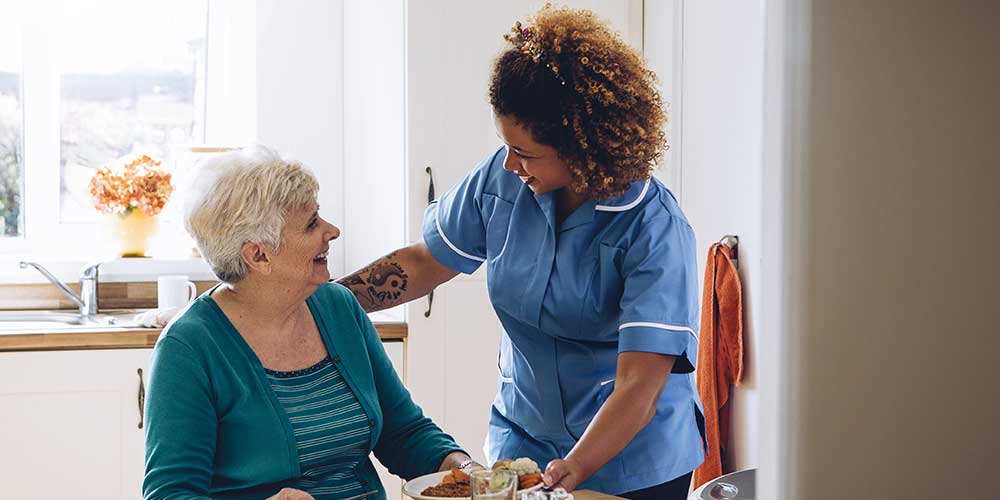
Palliative Care vs. Hospice: What’s the Difference?
January 13, 2022
Inside Assisted Living Facilities: What They Are and How They’re Different
January 28, 2022Director Series 1: Home Care with Marco Aguiluz
About The Director Series
The Director Series—a Parentis Health Learning Center exclusive—connects you with our leadership team in a whole new way to discuss home care.
This series helps highlight what each service offers. We discuss how home care can help patients and families, and how to keep costs under control without compromise.
Understanding Home Care With Parentis Health’s Director Of Home Care, Marco Aguiluz
Home care is one of several essential support services offered by Parentis Health. As a result, we empower patients, primary caregivers and families to live safer, easier lives with home-based care.
In this informative overview, Parentis Health Home Care Director Marco Aguiluz discusses:
- What home care involves
- How families can offset costs under Medicare
- How Parentis Health’s continuum of care model connects different care needs for truly personalized care plans
What Is home care?

Home care has been getting more attention lately. It’s a central component of the much-discussed Build Back Better bill1. As a result, if passed it allocates $150B for home care coverage through Medicare and Medicaid. Consequently, it can become more accessible and affordable for Americans than ever before.
Parentis Health Home Care Director Marco Aguiluz is a registered nurse and former assisted living facility caregiver. Moreover, he has first-hand knowledge of the importance of home care, as well as how much it can help families with everyday life.
“This care involves in-home services that are non-medical, but highly valuable to clients, primary caregivers and families. It gives them extra help with regular, everyday needs,” Aguiluz offers.
The five pillars of home care
For example, because it is a non-medical service, what providers can offer centers around assisting with daily living needs. However, this doesn’t diminish the value home care offers patients and families. Plus, service can be expanded to offset the care as needed.
Home care features five main service pillars:
- Assistance with activities of daily living, including everyday chores, running errands, and companionship
- Personal care and grooming, including bathing, incontinence assistance, and helping patients get dressed and ready for the day
- Safety supervision and standby assistance, including helping getting around the house, preventing falls, and standing by as patients move about independently, adding an extra layer of security for seniors in the home setting
- Meal preparation, including simple meal preparation and assembly
- Medication reminders, ensuring patients keep on schedule with doctor recommendations and guidelines
Medication reminders do not involve medication administration. This service falls under home health. Therefore, care is taken to help patients stay organized and on track. In addition, tracking helps with medications through the use of charts, hero devices to automate medication delivery and everyday reminders.
Respite care

Meanwhile, caring for aging loved ones is very challenging for family members. Moreover, it is challenging physically, mentally and emotionally. For primary caregivers and families, extra help can be a lifesaver.
The importance of respite care is recognized by the Centers for Medicare & Medicaid Services (CMS), and is offered as a hospice care benefit. However, for families who don’t have loved ones in hospice care, home care gives them the ability to take a break too. “Home care helps families enjoy the benefits of respite services without needing to have a loved one in hospice. With home care, clients can get assistance and support around the house. This can make all the difference to primary caregivers.” Aguiluz elaborates.
In conclusion, it helps families get the benefits of respite care. Plus, this includes everyday assistance to personal care and safety supervision. Whether or not their loved ones are in hospice care.
Assessing patient and family needs

Similarly, we ensure that clients, primary caregivers and families get the care they need. The process begins with an in-person, in-home assessment. Aguiluz typically conducts this assessment himself.
“The assessment process makes sure that patients and families have the right kind of care. In-home is always ideal. But there’s no way to determine if that’s the best option without going to meet with families in person,” Aguiluz explains.
For example, in-home assessments take multiple factors into account, including the layout of the home as well as a patient’s individual needs. As Aguiluz notes, “We always note whether or not clients need 24/7 care as well as the patient’s mobility, with or without the use of a walker or a cane. But we also evaluate how safe a prospective client’s home is. If there are multiple stairs patients have to use, or if the bathroom is hard to access, the home setting may not be ideal.”
Assuming that patients don’t need 24/7 care and can get around their homes with relative ease, Aguiluz helps develop a detailed, and highly customized plan to provide in-home, non-medical care.
Controlling home care costs

This care is covered under Medicare in some circumstances. In addition, this includes palliative care and hospice care. However, it often requires out-of-pocket expenses.
To help families control costs, Aguiluz advises families about coverage options under Medicare Part C (Medicare Advantage). In addition, they can consider state and regional resources that can provide additional funding.
Recently, Parentis Health formed a partnership with SCAN Health Plan. They are a not-for-profit HMO plan with a Medicare Advantage contract that services Arizona, California and Nevada. SCAN works with Parentis Health to help patients continue to receive health care at home. Moreover, they also afford primary caregivers and families a modicum of respite care.
As Aguiluz explains, “SCAN helps ensure its members can utilize our services regularly.” Patients with Medicare Advantage (Medicare Part C) can get the visits covered, similar to palliative care coverage options under Medicare. Therefore, families can also pay for additional services, including extra visits and coordinated care services.
In contrast, not all clients and families have Medicare Advantage. In addition, they may not qualify for Medicare coverage, Aguiluz offers additional state and regional resources to help them offset costs, including California’s statewide In-Home Supportive Services (IHSS) program and the non-profit organization Caregiver Resource Center OC.
The IHSS program covers the cost of home care services to select California state residents2. Caregiver Resource Center OC helps offset the costs of in-home respite care via grant money; grants are authorized based on income and other factors.3
A true continuum of care
This care is non-medical. As a result, families may need additional assistance to care properly for their loved ones in the home setting.
Through Parentis Health’s continuum of care model, families can easily enhance home care with home health and other services. Parentis Health is the only healthcare company that offers coordinated services under one roof, Parentis Health is able to provide all of the care patients and families need effortlessly.
“Parentis Health’s continuum of care model makes it very easy for families to get additional services like Home Health and non-medical transportation. Home Care can’t provide medical assistance. As a result, the ability to quickly add Home Health is a huge help with things like medication administration,” Aguiluz adds.
Trusting one company for all necessary services also makes it much easier for patients to remain in the home setting. “Ultimately, the goal of is to help individuals stay where they’re the most comfortable. This is typically in their own homes. And coordinated care services really help make that possible,” Aguiluz concludes.
The Parentis Health Learning Center is a trusted source for information, developed by our team of healthcare experts and created to inform and help guide patients and families on their healthcare journey.
1https://homehealthcarenews.com/2021/10/gutted-version-of-bidens-build-back-better-plan-still-includes-150-billion-for-in-home-care/, accessed 1/5/22.
2https://www.cdss.ca.gov/in-home-supportive-services, accessed 1/7/22.
3https://www.caregiveroc.org/services, accessed 1/5/22.

